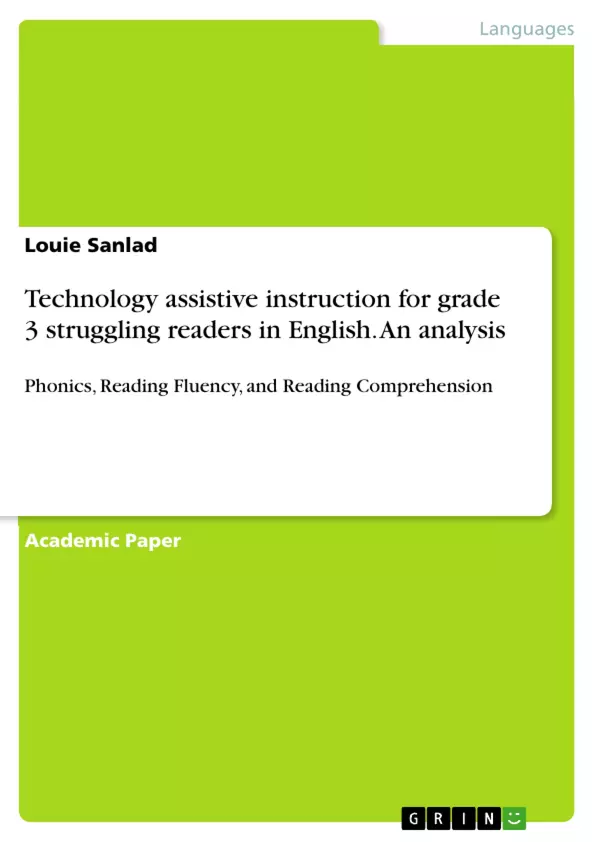This action research was conducted at Mayor AS Fortuna Memorial Elementary School during school year 2020 -2021.
The gathering of the data was done according to the following scheme: preliminary preparation, administration and collection of instruments, scoring and statistical treatment of data. This research used a survey-based design to assess the significance of technology assistive instruction for grade 3 struggling readers in English.
The reading performance in English of grade 3 learners as to oral fluency was instructional. The data implied that some learners promoted to the next level even if their reading ability were frustration. Their performance level in comprehension was also instructional. It showed that there were still many learners in the grade three level under frustration level in the comprehension. All of the respondents read the Self-Learning Kit.
Twenty one of them preferred to read books and some were using mobilephone. Hence, children are not allowed to go to school because of the pandemic, one of the primary sources of the learners in reading was books aside from SLK due to the availability of the materials or resources at home. Eighteen of them or 58 percent spent time in reading during their free time for less than 30 minutes with verbal description of infrequent.
This study proves that Assistive –Technology Instruction significantly improved the reading performance of the Grade Three Struggling Readers in English. The top three issues encountered by the learners and researchers in the implementation of the program were lack of resources, lack of parent involvement, and competing priorities.
Inhaltsverzeichnis (Table of Contents)
- INTRODUCTION
- Rationale
- RESEARCH QUESTIONS
- METHODOLOGY
- DISCUSSION OF RESULTS AND REFLECTION
- SUMMARY OF FINDINGS
Zielsetzung und Themenschwerpunkte (Objectives and Key Themes)
This research examines the role of technology-assisted instruction (TAI) in improving reading skills for struggling readers. The study aims to explore the effectiveness of TAI as an integral part of a reading instructional program, focusing specifically on its impact on decoding skills, comprehension, and overall reading proficiency. The research is anchored on the "Every Child A Reader Program," a Philippine Department of Education initiative to improve reading literacy among all students.
- The importance of reading skills for academic success
- The challenges faced by struggling readers and the need for effective intervention strategies
- The potential of technology-assisted instruction (TAI) as a tool for improving reading skills
- The role of parental involvement in supporting reading development
- The impact of TAI on students' decoding skills, comprehension, and overall reading proficiency
Zusammenfassung der Kapitel (Chapter Summaries)
- INTRODUCTION: This chapter provides a foundational understanding of reading and its importance in education. It explores the complexity of reading acquisition, highlighting the interdependence of decoding skills, oral language comprehension, and background knowledge. The chapter also emphasizes the significance of effective reading instruction and the challenges faced by struggling readers.
- RESEARCH QUESTIONS: This section lays out the specific questions guiding the research, focusing on the effectiveness of TAI as an intervention for struggling readers.
- METHODOLOGY: This chapter details the research methods employed to investigate the effectiveness of TAI. It describes the study design, participants, data collection methods, and data analysis techniques used to answer the research questions.
- DISCUSSION OF RESULTS AND REFLECTION: This chapter presents and analyzes the research findings, exploring the impact of TAI on struggling readers' reading skills and overall academic performance. It critically examines the evidence gathered, considering its implications for educational practices and future research.
Schlüsselwörter (Keywords)
This research focuses on the intersection of reading instruction, technology-assisted instruction (TAI), struggling readers, decoding skills, comprehension, reading proficiency, parental involvement, and the "Every Child A Reader Program".
Frequently Asked Questions
What is Technology-Assisted Instruction (TAI)?
TAI refers to the use of technological tools and software to support and enhance the instructional process, specifically for improving reading skills.
How does TAI help struggling readers?
The study proves that TAI significantly improves reading performance, particularly in oral fluency, decoding skills, and comprehension for grade 3 students.
What were the main challenges in implementing the TAI program?
The top issues encountered were a lack of resources, limited parental involvement, and competing priorities during the pandemic.
What is the "Every Child A Reader Program"?
It is a Philippine Department of Education initiative aimed at ensuring all students develop essential reading literacy skills.
How did the pandemic affect reading habits?
Due to school closures, many learners relied on Self-Learning Kits (SLK) and available home resources like mobile phones for reading, though time spent reading was often limited.
- Citar trabajo
- Louie Sanlad (Autor), 2021, Technology assistive instruction for grade 3 struggling readers in English. An analysis, Múnich, GRIN Verlag, https://www.grin.com/document/1118841



